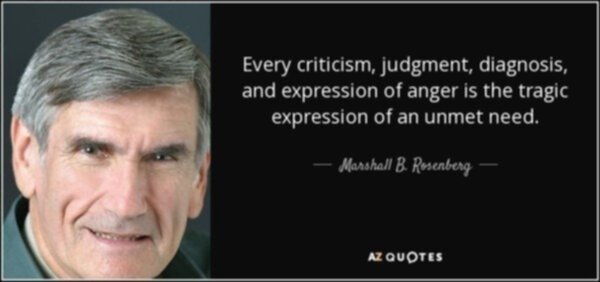Nonviolent Communication | Marshall Rosenberg
Marshall Rosenberg, Ph.D.
Nonviolent Communication
Nonviolent communication is a language designed for everyone to get what we want. This translates to what we might be feeling or needing each moment of our lives.

This workshop covers the feelings we have when we're observing without evaluating, and connecting those feelings to the universal needs. Those needs are then followed up with how we meet them through strategies, preferences & requests.
"Please" is an expression of unmet need & "thank you" is an expression of met needs. The root of feelings are our 'needs.'
All needs are universal. What differs immensely is our strategies to meet our needs.
What are your needs? Often, we never know what we truly want or need until after we get it.
Who is Marshall Rosenberg?
A Visionary Teacher
Marshall Rosenberg was a remarkable psychologist, mediator, author and teacher. He positively influenced many lives with his simple but profound philosophy of Nonviolent Communication (NVC). Born in 1934 in Ohio, Marshall was deeply curious about what causes people to connect or disconnect, and to live harmoniously or in conflict. His experiences as a civil rights activist and later as a clinical psychologist working in various settings worldwide led him to create the transformative process of NVC.
The Language of Life
At its heart, NVC is a "language of life". It helps people communicate with more authenticity, compassion and clarity. NVC focuses on two main questions: What's alive in us? And what would make life more wonderful? When we express ourselves vulnerably and listen to others with empathy, rather than judging or blaming, we enable deeper understanding and cooperation.
Understanding Human Needs
Marshall taught that all actions are attempts to meet basic human needs like safety, belonging, autonomy and meaning. By being mindful of the needs behind our own and others' words and actions, we can resolve conflicts peacefully, unlock creativity, and experience the joy of contributing to each other's wellbeing. Furthermore, NVC helps us transform habitual thinking and communication patterns that separate us from our natural compassion.
An Inspiring Legacy
With his gentle strength, warm smile and lively humor, Marshall embodied the consciousness he taught. He inspired people globally with his message that peace is possible, one interaction at a time. Although he passed away in 2015, his legacy endures through his books, recordings, the Center for Nonviolent Communication, and the worldwide NVC community who continue sharing his wisdom.
Our world is more compassionate because of Marshall Rosenberg. We can honor him by aspiring to embody nonviolence in our thoughts, words and actions. Additionally, we can aim to strengthen our ability to connect across differences with courageous honesty and sincere empathy. As Marshall wisely said, "Peace requires something far more difficult than revenge or merely turning the other cheek; it requires empathizing with the fears and unmet needs that provide the impetus for people to attack each other." Thank you Marshall for this guiding light. May it illuminate our path ahead.
Marshall Rosenberg, Ph.D.
Nonviolent Communication
Nonviolent communication is a language designed for everyone to get what we want. This translates to what we might be feeling or needing each moment of our lives.

This workshop covers the feelings we have when we’re observing without evaluating, and connecting those feelings to the universal needs. Those needs are then followed up with how we meet them through strategies, preferences & requests.
“Please” is an expression of unmet need & “thank you” is an expression of met needs. The root of feelings are our ‘needs.’
All needs are universal. What differs immensely is our strategies to meet our needs.
What are your needs? Often, we never know what we truly want or need until after we get it.
Who is Marshall Rosenberg?
A Visionary Teacher
Marshall Rosenberg was a remarkable psychologist, mediator, author and teacher. He positively influenced many lives with his simple but profound philosophy of Nonviolent Communication (NVC). Born in 1934 in Ohio, Marshall was deeply curious about what causes people to connect or disconnect, and to live harmoniously or in conflict. His experiences as a civil rights activist and later as a clinical psychologist working in various settings worldwide led him to create the transformative process of NVC.
The Language of Life
At its heart, NVC is a “language of life”. It helps people communicate with more authenticity, compassion and clarity. NVC focuses on two main questions: What’s alive in us? And what would make life more wonderful? When we express ourselves vulnerably and listen to others with empathy, rather than judging or blaming, we enable deeper understanding and cooperation.
Understanding Human Needs
Marshall taught that all actions are attempts to meet basic human needs like safety, belonging, autonomy and meaning. By being mindful of the needs behind our own and others’ words and actions, we can resolve conflicts peacefully, unlock creativity, and experience the joy of contributing to each other’s wellbeing. Furthermore, NVC helps us transform habitual thinking and communication patterns that separate us from our natural compassion.
An Inspiring Legacy
With his gentle strength, warm smile and lively humor, Marshall embodied the consciousness he taught. He inspired people globally with his message that peace is possible, one interaction at a time. Although he passed away in 2015, his legacy endures through his books, recordings, the Center for Nonviolent Communication, and the worldwide NVC community who continue sharing his wisdom.
Our world is more compassionate because of Marshall Rosenberg. We can honor him by aspiring to embody nonviolence in our thoughts, words and actions. Additionally, we can aim to strengthen our ability to connect across differences with courageous honesty and sincere empathy. As Marshall wisely said, “Peace requires something far more difficult than revenge or merely turning the other cheek; it requires empathizing with the fears and unmet needs that provide the impetus for people to attack each other.” Thank you Marshall for this guiding light. May it illuminate our path ahead.
Like this:
Like Loading...
Related


















Comments